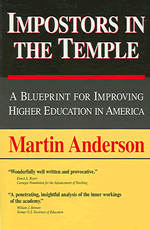College – Half was useless
(This drew a letter of agreement from Martin Anderson, author of IMPOSTERS IN THE TEMPLE.)
In a nation that venerates education, getting a college degree is seen as the ultimate goal, but is it? I’ve looked at what it did for me and my peers. We were ‘establishment’ types who were graduated from private and public colleges in ’63. Here are the results.(Keep in mind the difference professors and books can make.)
Astronomy- waste. Biology – terrible. Economics – could have been terrific. Education courses – infamous. English – essential when practical. Geography – delightful. Government – could have been good. History – good, but left out non-western cultures. International relations – good. A foreign language – probably useless for most. Literature – could have been good if we’d had authors like Jack London and Ernie Pyle. Logic – waste. Philosophy – waste. Psychology – should have been practical. Sociology – laughable. Speech – no impact.
We had nothing on resume writing, job hunting, managing money, traditional values, human nature, corruption, politics, military life, religious scandals, the gay world, prejudice, social classes, the fallibilities of professionals, and how to read the media. We had nothing on maturity in relation to: friendship, courting, sex, vice, crime, religion, cults, idealism, politics, parenting, liberalism, and conservatism.
Did college make me and my peers:
Better citizens? Slightly.
More cultured? Slightly.
Aware of various fields? Too theoretically.
More employable? Not for the effort involved.
Ready for graduate school? If one needs four years.
Ready for the real world? No.
More mature? Not like the real world would have.
Aware of our creativity? Hardly.
Was college worth what it cost us, our parents and the taxpayers? No. After college, we kept few textbooks and never reviewed our notes. We were verbose. Some took jobs requiring no degree. Some went back to school to learn typing. Some sought career counseling as they had been in the wrong field.
Presently many are smart, but not intellectual, and are more subjective and prejudiced than they’d like to think. All are reluctant to consider that half of what we studied we never used, nor even heard of since college.
Many of the girls went to college to find a husband and never used their degrees.
We were conditioned to be liberal. One professor said as we got older, we would get more conservative. Prophetic, but not explained.
My degree didn’t help in teaching and writing. In social work, politics, and mental health, it was often a hindrance, as it’s ‘liberal’ bent was far off the mark and it didn’t make me ‘streetwise.’ I’m glad I didn’t go to graduate school in those fields.
My real education was: living in slums and in New York City, the domestic version of the Peace Corps, career counseling, running a home for mental patients, renting rooms in my house, being self-employed, the fallible media, and life itself. As it turned out, I had to unlearn much of what college and the media had taught me. Hence my interest in noted author Ray Bradbury’s saying he was ‘one of the few lucky enough not to go to college.’ (Famed Russian author Solzhenitsyn said his ‘education’ was being a prisoner in Siberia.)
College consists of missing information, useful information, useless information, and misinformation. Those who didn’t finish didn’t miss as much as they’re led to believe.
The useful parts were: – Vocabulary and concepts. – Learning to think, speak and write objectively and critically. – Exposing myths. – Independent study. – Writing papers on favorite subjects. – Exchange student programs (tops). – Student government, Model United Nations, and special interest clubs.
College should retain these, but require achievement in: 1) Traditional values, 2) Mental health, 3) Physical health, 4) Career counseling, 5) Internships, and 6) Practical courses. Students could be tested and given credit for achievements in outside activities that fit these categories. If this was done, more families would get their students into such activities. Everyone would gain – students, parents, professors, colleges, and society.

